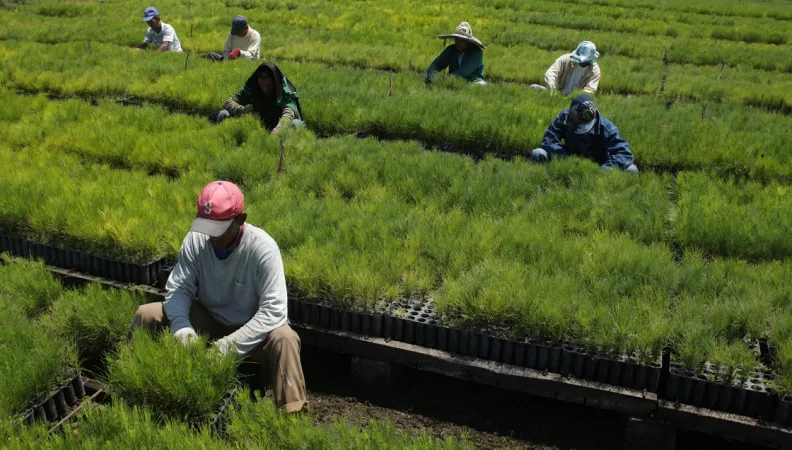Share the page
The Dominican Republic: From Deforestation to Reforestation
Published on

Since 2001, the watershed region of the Yaque del Norte, the main river in the Dominican Republic, has with AFD’s support, been experimenting with an unprecedented territorial management program reconciling reforestation with agriculture and livestock farming. Building on the progress achieved over the last two decades, the project is now entering its third phase and aims to scale up.
Since the 1950s, the Cordillera Central, the main mountainous region in the Dominican Republic, has been suffered from massive deforestation. This is mainly due to widespread agriculture, livestock farming and logging, which pose a threat to the natural balance of ecosystems.
This imbalance has been exacerbated by the first effects of climate change which is degrading the quality of life and restricts locals’ capacity to develop income-generating activities.
The watershed region of the Yaque del Norte, the longest river in the Dominican Republic, is a rare exception. In two decades, it has managed to reverse this trend and has even regained the forest cover it had in the 1950s. This small miracle is due to an original public-private partnership established in 2001: Plan Sierra, named after the association responsible for its implementation.
Customized support
“The key to the success of Plan Sierra is that it has found the right combination between a customized approach and an integrated vision of the territory as a whole. It has overcome the usual risks of conflicts between the preservation of natural resources, agriculture and livestock farming”, says Sandra Kassab, AFD’s Director in Santo Domingo. “Thanks to the strong support from communities built up over the years, Plan Sierra has helped many small-scale local stakeholders develop and implement activities tailored to their needs.”
During phases 1 and 2 of the project, these activities have achieved significant benefits in the watershed area: 10,250 hectares have already been replanted and 1,000 new families now have access to a continuous drinking water supply.
These excellent social and environmental results are also due to the exchange of good practices with France, in particular on Integrated Water Resources Management (IWRM): “The cooperation with the company Canal de Provence and a study tour in France have helped Plan Sierra build up its expertise in coordinated land use, water resources and ecosystem management in the interests of socioeconomic development”, says Bénédicte Alsac, Project Manager at AFD’s headquarters.
Capitalizing on achievements
Building on the success and reclaimed forest cover under Plan Sierra, the project is now entering its third phase, which will strengthen territorial management model, whose added value is mainly based on the extensive knowledge and field experience of local associations.
In early 2020, AFD allocated a €20 million concessional loan to the Dominican Republic, combined with a €1.5 million grant. These new funds will help the association scale up. The many customized activities the association will implement include the establishment of a policy to support the professionalization of sectors at all levels: “For example, the dairy industry will be transformed by giving technical training to farmers that use silvopastoralism practices, (from silvopasture: the practice of integrating trees, forage, and the grazing of domesticated animals in a mutually beneficial way),” says Patricia Andrade, Communication Officer at the Santo Domingo office.
Strengthening Evaluation Capacity
The communities will also be supported through the construction and management of new water supply systems, in partnership with the public operator for drinking water distribution in the Sierra region.
A study will explore the opportunity for Plan Sierra of implementing payment mechanisms for ecosystem services. The third phase will provide the opportunity to experiment with new sources of financing, for example, via the carbon certification of new activities for emission credits on the voluntary carbon market.
